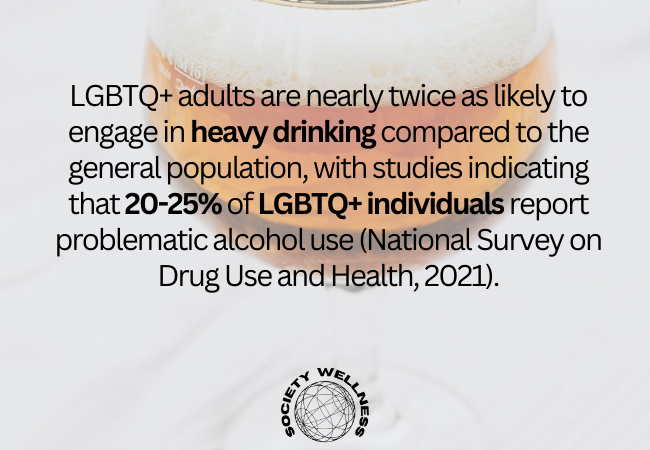Excessive alcohol consumption can severely affect the brain, leading to cognitive, emotional, and physical impairments. For members of the LGBTQ+ community, the risks of alcohol misuse may be amplified by stressors such as societal discrimination, stigma, and lack of inclusive support systems. However, hope is not lost—scientific evidence shows that the brain has remarkable healing potential, and specialized treatment programs can accelerate this process.
At LGBTQ Addiction Centers, we provide affirming, evidence-based care tailored to LGBTQ+ individuals navigating alcohol addiction and co-occurring mental health challenges. In this article, we’ll explore how alcohol affects the brain, the recovery process, and how our LGBTQ-specific programs can support your healing journey.
How Does Alcohol Affect the Brain?
Chronic alcohol use disrupts brain function by interfering with its structure and chemistry. Key areas impacted include:
- The Hippocampus:
- Role: Responsible for memory and learning.
- Effect of Alcohol: Prolonged alcohol misuse can lead to memory loss and difficulty learning new information, a condition sometimes referred to as “alcohol-related dementia.”
- The Prefrontal Cortex:
- Role: Controls decision-making, impulse regulation, and judgment.
- Effect of Alcohol: Long-term alcohol use can impair reasoning skills and increase impulsivity, leading to risky behaviors.
- The Cerebellum:
- Role: Regulates coordination, balance, and motor skills.
- Effect of Alcohol: Damage to this area results in difficulty with movement and coordination.
- Neurotransmitter Systems:
- Role: Facilitate communication between brain cells.
- Effect of Alcohol: Alters levels of key chemicals like serotonin and dopamine, leading to mood disorders such as anxiety or depression.
These changes are often magnified in LGBTQ+ individuals due to the compounded stress of societal pressures, lack of acceptance, or trauma related to their identity.
The Role of Nutrition in Brain Repair
Proper nutrition plays a vital role in repairing the damage caused by alcohol misuse. Chronic alcohol consumption depletes the body of essential vitamins and minerals, many of which are critical for brain function. Replenishing these nutrients can help restore cognitive health and improve overall well-being.
Key nutrients for brain repair include:
- Thiamine (Vitamin B1): Vital for energy production in brain cells, thiamine is often depleted in individuals with alcohol use disorder. Deficiency can lead to memory problems and neurological issues.
- Omega-3 Fatty Acids: Found in fish, flaxseeds, and walnuts, omega-3s support brain cell structure and communication.
- Antioxidants: Vitamins C and E combat oxidative stress, which alcohol exacerbates, protecting brain cells from further damage.
- Magnesium: Important for neurotransmitter function, magnesium levels are often reduced by alcohol consumption.
Can the Brain Recover from Alcohol Damage?
Yes, the brain has the capacity to heal from alcohol-related damage, thanks to neuroplasticity—its ability to reorganize and form new neural pathways. While full recovery may depend on several factors, including the severity of damage and how early intervention occurs, progress is achievable with the right steps:
- Complete Abstinence:
- Halting alcohol use prevents further damage and allows the brain to begin repairing itself.
- LGBTQ Addiction Centers provide structured environments through programs like our LGBTQ Day Treatment Program and Night Treatment Program, ensuring a safe and supportive path to sobriety.
- Nutritional and Physical Healing:
- Chronic alcohol use depletes essential nutrients like thiamine (Vitamin B1), which is critical for brain health.
- Our programs include nutritional counseling to help restore physical and mental well-being.
- Therapeutic Interventions:
- Evidence-based therapies such as Cognitive-Behavioral Therapy (CBT) help address negative thought patterns that may contribute to alcohol misuse.
- Dialectical Behavior Therapy (DBT) is especially effective for managing emotional distress and improving interpersonal relationships.
- Mental Health Support:
- Addressing co-occurring conditions like anxiety, depression, or PTSD is critical for sustained recovery.
- LGBTQ Addiction Centers offer comprehensive LGBTQ Mental Health Programs tailored to individual needs, including LGBTQ Anxiety Treatment.
Mental Health and Alcohol Recovery
Mental health and alcohol misuse are deeply intertwined. Many individuals use alcohol to cope with anxiety, depression, or trauma, but over time, alcohol exacerbates these conditions. For LGBTQ+ individuals, the challenges of mental health recovery are often compounded by societal stigma and minority stress.
Recovery from alcohol misuse requires addressing these co-occurring disorders. Evidence-based therapies such as Cognitive-Behavioral Therapy (CBT) and Dialectical Behavior Therapy (DBT) are particularly effective:
- CBT: Helps identify and change negative thought patterns that may contribute to alcohol use.
- DBT: Offers strategies to manage intense emotions and build healthier coping mechanisms.
Stress and Recovery in the LGBTQ+ Community
Stress is a significant factor in both the development and recovery from alcohol addiction. Members of the LGBTQ+ community often face unique stressors, including discrimination, internalized homophobia, and the trauma of rejection by family or society. These challenges can drive individuals to use alcohol as a coping mechanism, creating a cycle of dependence and harm.
Recovery requires addressing these stressors directly. LGBTQ Addiction Centers provide a safe, affirming environment where clients can:
- Explore the impact of societal pressures on their mental health.
- Develop stress management skills through mindfulness, yoga, or DBT techniques.
- Build connections with peers who understand their lived experiences.
By addressing the root causes of stress, we help individuals create sustainable recovery plans that prioritize emotional well-being.
The Importance of LGBTQ-Affirming Care
For many LGBTQ+ individuals, seeking help for addiction or mental health issues can be intimidating. Concerns about judgment, lack of understanding, or misrepresentation of their identity can deter people from accessing the care they need.
That’s why LGBTQ-affirming care is essential. At LGBTQ Addiction Centers, we ensure our programs are inclusive and tailored to the unique needs of the community. Key features of our approach include:
- Specialized Programs: From our LGBTQ Addiction Treatment Programs to Evening Outpatient Programs, every service is designed with LGBTQ+ individuals in mind.
- Safe Spaces: We foster an environment where clients feel respected and understood.
- Holistic Healing: Beyond addiction, we address co-occurring conditions and underlying trauma, ensuring clients feel seen as whole individuals.
- Peer Support Groups: Building connections within the LGBTQ+ community can help combat isolation and provide invaluable encouragement during recovery.
Why LGBTQ-Specific Care is Essential
LGBTQ+ individuals often experience unique barriers to treatment, such as fear of judgment, a lack of inclusive care, or additional mental health burdens. That’s why LGBTQ Addiction Centers are committed to creating safe, affirming spaces where clients can heal without fear of discrimination.
We offer:
- LGBTQ Addiction Treatment Programs designed specifically for members of the community.
- Flexible scheduling through LGBTQ Day Treatment Programs and Evening Outpatient Programs to meet various lifestyles and commitments.
- Trauma-Informed Care to address underlying emotional wounds contributing to alcohol misuse.
Steps LGBTQ Addiction Centers Take to Support Brain Recovery
- Holistic Approach to Treatment:
Our programs go beyond addressing alcohol addiction. We integrate therapies and wellness strategies that promote full recovery, including:- Nutritional and fitness programs to restore physical health.
- Art and mindfulness therapy to enhance emotional well-being.
- Evidence-Based Therapies:
- Cognitive-Behavioral Therapy (CBT): Teaches individuals to recognize and modify harmful behaviors and thought patterns.
- Dialectical Behavior Therapy (DBT): Helps manage intense emotions and improve communication skills, particularly valuable for LGBTQ+ individuals navigating relationship challenges.
- Community and Peer Support:
Feeling understood is a vital part of recovery. Our LGBTQ-specific support groups foster connection and solidarity, allowing clients to share their experiences and find strength in their community.
The Path to a Healthier Future
The brain’s ability to recover from alcohol damage is both inspiring and achievable with the right interventions. At LGBTQ Addiction Centers, we’re dedicated to helping you reclaim your cognitive health and emotional well-being. Our LGBTQ-focused programs provide the tools, therapies, and support necessary for long-term recovery. Reach out to us at (888) 598-9510 to learn more about our specialized programs and how we can support your journey to recovery.
FAQs on Brain Recovery from Alcohol Damage
Can the brain fully recover from alcohol damage?
The brain has a remarkable ability to heal through neuroplasticity, but the extent of recovery depends on factors such as the severity of the damage, duration of alcohol use, and whether treatment and abstinence are maintained.
How does alcohol affect mental health in LGBTQ+ individuals?
Alcohol can worsen conditions like anxiety and depression, which may already be heightened in LGBTQ+ individuals due to societal stigma and minority stress. Addressing these co-occurring issues is essential for recovery.
What therapies help with brain recovery from alcohol damage?
Evidence-based therapies like Cognitive-Behavioral Therapy (CBT) and Dialectical Behavior Therapy (DBT) are effective in treating addiction and supporting brain recovery. They address negative thought patterns and emotional regulation.
Why is LGBTQ-affirming care important for addiction treatment?
LGBTQ-affirming care provides a safe, inclusive space where individuals can address addiction and mental health challenges without fear of judgment. It also considers the unique stressors and traumas faced by the LGBTQ+ community.
How can nutrition support brain recovery?
A nutrient-rich diet can replenish essential vitamins and minerals depleted by alcohol use. Key nutrients like thiamine, omega-3 fatty acids, and antioxidants are crucial for brain repair.
What programs are available at LGBTQ Addiction Centers?
LGBTQ Addiction Centers offer tailored programs such as LGBTQ Day Treatment, LGBTQ Night Treatment, and Evening Outpatient Programs. These programs provide holistic care for addiction recovery and mental health support.

